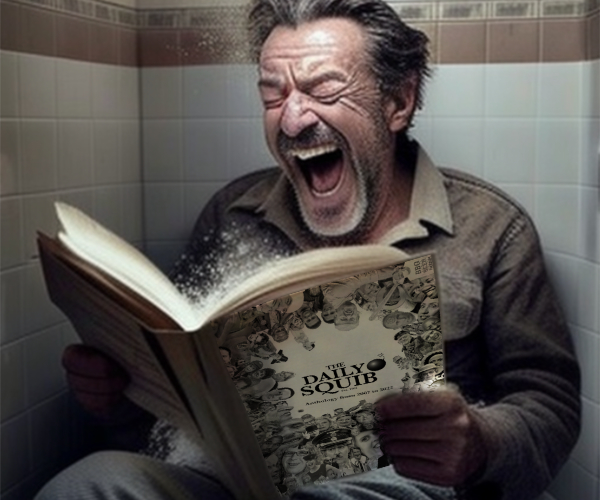As one of the jurors for the humour section in this year’s prestigious Epica Awards for creative excellence in the advertising world, the Daily Squib has also been given access to interview Mark Tungate, the Editorial Director for the Epica Awards.
Mark Tungate, apart from being a stand up guy, is a journalist with 30 years of experience, who has written for everybody from the Financial Times and The Guardian to Campaign and Advertising Age. He is the author of several books about advertising and branding including Adland: A Global History of Advertising, Branded Beauty: How Marketing Changed the Way We Look and Fashion Brands.
Daily Squib Editor Aur Esenbel Interviews Epica Awards Editorial Director and Author Mark Tungate
AE – I grew up in the era of memorable advertising slogans like Beanz Meanz Heinz, J.R. Hartley and R.Whites Lemonade. One of the best adverts in my opinion has to be the Orwellian 1984 Apple computers parody advert directed by Ridley Scott. These were such memorable advertising experiences that they are still vivid moments in the memory today. Do you think the longevity of advertising has changed today, so that much of it is disposable or cloaked in cgi technology/photoshop it loses lasting character?
MT – It sounds like we’re of the same generation – I remember those ads too. In fact I specifically remember my granddad singing the R. White’s Lemonade jingle and falling about laughing. I don’t think advertising has become disposable – as a commentator on the industry and the host of the Epica jury, I see fantastic ads all the time – but I think we have less available space in our brains. It’s the new/old problem of information deluge. So many images flicker past our eyes every day that we struggle to hold on to them. Plus we’re not really watching broadcast TV any more: we’re watching Netflix. So traditional ads not only have problems hooking themselves into our memories, they have problems reaching us in the first place.
AE – I am a great fan of George Lois and his creative thought process. He once said in an interview on The David Susskind Show that “Advertising is poison gas. It should bring tears to your eyes, unhinge your nervous system, and knock you out.” This is the sort of creative technique the Daily Squib lives by, however do you think things have been watered down too much in the advertising business today, especially in the sense of political correctness?
MT – Well, it’s certainly not for me to disagree with the great George Lois. I interviewed him once in his Greenwich Village home and he was incredibly gracious for a big guy with a history of fierceness. He was also predictably handy with an anecdote. In short, I think he’s righter today than he’s ever been: for the reasons above, if an ad doesn’t knock your socks off it’s going to be wiped from your mind minutes later. If you take a stroll through the Epica Awards archive you’ll see many ads that deliberately set out to send eyebrows skywards. This one, for example:
HEIMAT Berlin “You’re alive. Do you remember?”
Or this one:
The Devil You Know – “Figaro” Bret Easton Ellis
But perhaps the cleverest ads are the ones that manage to hold our attention without resorting to nudity or violence.
AE – Of course, we could not talk about the subject of advertising and PR/Marketing without mentioning my all-time hero Edward Bernays, the pioneer of the Torches of Freedom, emancipating the women’s movement to smoke in public. Rather ominously, as another example, in the 1930s, Bernays worked on the Dixie Cup campaign which was designed to convince consumers that only disposable cups were sanitary by linking the imagery of an overflowing cup with subliminal images of vaginas and venereal disease. Even though he worked a lot in secrecy and through third parties, do you think Bernays’ guerilla techniques, especially regarding subliminal messages could be viable today?
MT – It all sounds very Black Mirror, doesn’t it? These approaches might still work if you could sneak them past the client. Frankly I’m more worried about the rise of Artificial Intelligence. There have been a couple of examples lately of ads created by AI, and they always have something “off” about them. Perhaps we’re being brainwashed by machines. I wish AI would go away. As one of the characters in the movie Wargames commented: “I’d piss on a spark plug if I thought it’d do any good.”
Saatchi’s New Directors’ Showcase Features an A.I.-Created Film
AE – How has the internet generation’s low attention span affected advertising? I believe most people now switch off after less than three seconds, or do you think it has always been that hard to seize the attention of the viewer?
MT – I’ve never been too convinced by the attention span argument. People watch hours and hours of Game of Thrones. My six-year-old son, who must have one of the lowest attention spans in history, will happily sit through a 90 minute movie if it captures his imagination. We watched Pixar’s “Up” this week. All the way through. Twice. I think if your “content”, to use the buzzword du jour, is captivating enough you can glue people to their seats for as long as you want.
AE – Do you subscribe to the subtle school of advertising a la Ogilvy or the in your face Lois style?
MT – Well, I fancy myself a wordsmith and David Ogilvy was one of the greatest copywriters of all time – not to mention a dapper gent – so I admit to being attracted to his style. The form is decidedly retro today, but a long copy ad could be a way of cutting through the clutter in some circumstances. A well-written poster ad works brilliantly while you’re waiting for the Tube, for example. Above all Ogilvy told a good tale in a witty manner, and that’s still a valid approach. If you must sell us something, at least do it with entertainment value and a touch of class. I think Epica partly exists to encourage that kind of advertising.
AE – Do you think there is any role for satire in modern advertising, can satire sell?
MT – Abso bleeding lutely! Take a look at this. It’s a genuine ad for Halo Top, a US ice cream brand. In fact it’s the answer to almost all of your questions.
AE – A brilliant example may I dare say. Very Terry Gilliamesque and indeed does sum up the questions I asked. Thank you kindly for this very creative and insightful interview.
Don’t forget the Epica Awards are still open for entries Deadline: September 30




